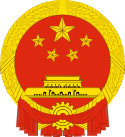- Deng Xiaoping Theory
-
People's Republic of China 
This article is part of the series:
Politics and government of
the People's Republic of ChinaIdeology- Leadership of China
- Constitutional history
- National People's Congress
- NPC Standing Committee
- President: Hu Jintao
- State Council (Central People's Government)
- Premier: Wen Jiabao
- Vice Premiers
- 1st ranking: Li Keqiang
- State Councilors
- Vice Premiers
- Premier: Wen Jiabao
- PRC Central Military Commission
- Supreme People's Court
- President: Wang Shengjun
- Supreme People's Procuratorate
- Procurator-General: Cao Jianming
- Political Consultative Conference
- National Committee
- Minor political parties
Other issues
Deng Xiaoping Theory (simplified Chinese: 邓小平理论; traditional Chinese: 鄧小平理論; pinyin: Dèng Xiǎopíng Lǐlùn), also known as Dengism, is the series of political and economic ideologies first developed by Chinese leader Deng Xiaoping. In theory, it does not reject Marxism or Mao Zedong Thought but instead seeks to adapt them to the existing socio-economic conditions of China.
Since the 1980s the theory has become a mandatory university class. Having served as the Communist Party of China's (CPC) major policy guide since the Third Plenum of the 11th CPC National Congress in 1978, the theory was entrenched into the Communist Party of China's Constitution as a guiding ideology in 1997, and was also subsequently written into the Constitution of the People's Republic of China.
Traditional Maoist theory put China's development focus on the "construction of socialism" and class struggle, while Deng's Theory emphasized economic construction and stability. Deng's social and economic philosophy attempted to merge a market economic model with a socialist political system. This became known as socialism with Chinese characteristics. Deng also stressed opening China to the outside world,[1] the implementation of one country, two systems, and the phrase "seek truth from facts", advocating for political and economic pragmatism.[2]
Contents
Relation to Maoism
Deng Xiaoping Theory argues that upholding Mao Zedong Thought does not mean blindly imitating Mao's actions without deviation as seen in the government of Hua Guofeng, and doing so would actually "contradict Mao Zedong Thought".[3]
Synopsis
One of the most famous maxims of Deng, dating back to the years before the Cultural Revolution, states that "It doesn't matter whether a cat is white or black, as long as it catches mice." In other words, he did not worry too much about whether a policy was capitalist or socialist as long as it improved the economy.[4] (This statement came to stand in opposition to the ideas of class struggle projected into economic relations, the latter being epitomized in a phrase "a socialist train coming with a delay is better than the capitalist one that comes on time").
China's phenomenal economic growth largely owes its success to this pragmatism of Deng Xiaoping's theory. The task faced by Deng was twofold: to promote modernization while preserving the ideological unity of CPC and its control of the difficult process of reforms.
The first was generalized by the concept of the Four Modernizations; the second was needed as protection from the popular unrest, threatening to undermine the reform process (see Democracy Wall of 1978, Tiananmen Incident of 1989).
This became the main motivation for ideological conservatism of Deng Xiaoping Theory: "Four Cardinal Principles" which the Communist Party must uphold, namely,
- Upholding the basic spirit of Communism
- Upholding the People's democratic dictatorship political system
- Upholding the leadership of the Communist Party
- Upholding Marxism-Leninism and Mao Zedong Thought
In 1992, fourteen years after Deng had risen up as China's de facto leader, he embarked on the "nanxun" or "Inspection visit to the South". There he, being already very old, uttered the famous words: "kaifang 开放!". These words, which literally mean "open up", would indeed prove to be very significant for China's economic and social development up until the current day. After this surge of motivation, China both economically and socially started expanding.
Sources
- ^ Deng Xiaoping (October 10, 1978). "CARRY OUT THE POLICY OF OPENING TO THE OUTSIDE WORLD AND LEARN ADVANCED SCIENCE AND TECHNOLOGY FROM OTHER COUNTRIES". http://english.peopledaily.com.cn/dengxp/vol2/text/b1240.html. Retrieved 2009-01-04.
- ^ "Ideological Foundation". http://english.cpc.people.com.cn/66739/4521326.html. Retrieved 2009-01-04.
- ^ Deng Xiaoping (September 16, 1978). "HOLD HIGH THE BANNER OF MAO ZEDONG THOUGHT AND ADHERE TO THE PRINCIPLE OF SEEKING TRUTH FROM FACTS". http://english.peopledaily.com.cn/dengxp/vol2/text/b1220.html. Retrieved 2009-01-04.
- ^ Fengbo Zhang
External links
Categories:- Politics of the People's Republic of China
- Political philosophy by politician
Wikimedia Foundation. 2010.
